When five year old Gabriella hears talk of Castro and something called revolution in her home in Cuba, she doesn’t understand. Then when her parents leave suddenly and she remains with her grandparents, life isn’t the same. Soon the day comes when she goes to live with her parents in a new place called the Bronx. It isn’t warm like Havana, and there is traffic not the ocean outside her window. Their life is different- it snows in the winter and the food at school is hot dogs and macaroni. What will it take for the Bronx to feel like home?
Cuba
The Wild Book
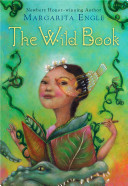
Fefa struggles with words. She has word blindness, or dyslexia, and the doctor says she will never read or write. Every time she tries, the letters jumble and spill off the page, leaping and hopping away like bullfrogs. How will she ever understand them? But her mother has an idea. She gives Fefa a blank book filled with clean white pages. “Think of it as a garden,” she says. Soon Fefa starts to sprinkle words across the pages of her wild book. She lets her words sprout like seedlings, shaky at first, then growing stronger and surer with each new day. And when her family is threatened, it is what Fefa has learned from her wild book that saves them.
See the review at WOW Review, Volume 4, Issue 3
The Road To Santiago
In Cuba, in the early 1950s, a young boy and his family try their best not to let the rebel soldiers keep them from traveling to Santiago to celebrate Christmas with their relatives. Based on a true incident in the life of the author.
The Other Half of Life
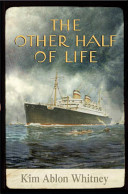
A heartbreaking novel based on the true story of a World War II voyage.In May of 1939, the SS St. Francis sets sail from Germany, carrying German Jews and other refugees away from Hitler’s regime. The passengers believe they are bound for freedom in Cuba and eventually the United States, but not all of them are celebrating. Fifteen-year-old Thomas is anxious about his parents and didn’t want to leave Germany: his father, a Jew, has been imprisoned and his mother, a Christian, is left behind, alone. Fourteen-year old Priska has her family with her, and she’s determined to enjoy the voyage, looking forward to their new lives. Based on the true story of the MS St. Louis, this historical young adult novel imagines two travelers and the lives they may have lived until events, and immigration laws, conspired to change their fates.
Old Dog
Perro Viejo was taken away from his mother at birth and has known no other life than that of servitude on a sugar plantation. His name, which means “Old Dog,” was given to him by the plantation master because, like the bloodhounds that chased fugitive slaves, Perro Viejo is always searching for the scent of his long lost mother. The only thing that keeps him alive is the memory of Asunción, a beautiful girl he once met while washing his master’s horses at a river. Never to see her again, he closes his heart to all forms of love. Nearing the end of his life, Perro Viejo meets Beira, an old slave who is avoided by the other slaves because they think she is a witch. She warms Perro Viejo’s heart, and together they hatch a plan to escape from slavery. Young readers join Perro Viejo as he finally learns what it is to love — and to feel free.
La Noche Buena
Nina is visiting her grandmother in Miami for Christmas. Usually she spends it in snowy New England with her mother and her family, but this year is different. She isn’t certain what to make of a hot and humid holiday, until she learns the traditions of her father’s side of the family from her Cuban grandmother. She helps prepare for the evening and takes part in all their traditions—the intricate cooking for the feast, the dancing, the music, and the gathering of relatives and neighbors. It all comes together for a Noche Buena that Nina will never forget. Antonio Sacre and Angela Dominguez have created a wonderful story that everyone who celebrates Christmas will enjoy. The book includes a glossary of Spanish words.
90 Miles To Havana
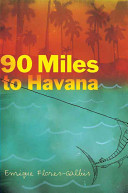
When Julian’s parents send him and his two brothers away from Cuba to Miami via the Pedro Pan Operation, the boys are thrust into a new world where bullies run rampant and it’s not always clear how best to protect themselves. By the author of Raining Sardines.
Dance, Nana, Dance / Baila, Nana, Baila
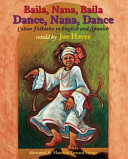
These folk stories teach the deep-hearted wisdom of the Cuban people.
Join the discussion of Dance, Nana, Dance / Baila, Nana, Baila as well as other books set in Cuba on our My Take/Your Take page.
My Name is Celia/Me Llamo Celia: The Life of Celia Cruz/La Vida de Celia Cruz
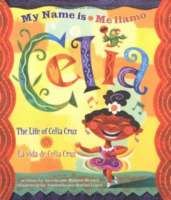
An exuberant picture-book biography of the Cuban-born salsa singer. From its rhythmic opening, the first-person narrative dances readers through Cruz’s youth in Havana, a childhood bounded by scents of nature and home, the sweet taste of sugar, and the sound of music. A singer from an early age, Cruz sang so continually that one of her teachers finally urged her to share her voice with the world. Thus encouraged, she entered competitions, undeterred when her racial heritage prevented her from competing – undeterred, even, when the advent of Castro’s communist regime forced her to leave Cuba as a refugee. Positive even in exile, Cruz made New York City her own and took Miami by storm. The salsa-influenced prose presented in English and in Spanish is followed by a straightforward vita of the singer, noting her death in July 2003. Lopez’s distinguished, luminous acrylic paintings are alive with motion, lush with brilliantly layered colors, and informed with verve and symbolism. This is a brilliant introduction to a significant woman and her music. The only enhancement required is the music itself.
My Havana: Memories of a Cuban Boyhood
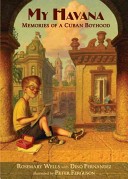
Relates events in the childhood of architect Secundino Fernandez, who left his beloved Havana, Cuba, with his parents, first to spend a year in Spain, and later to move to New York City.
